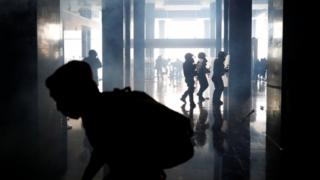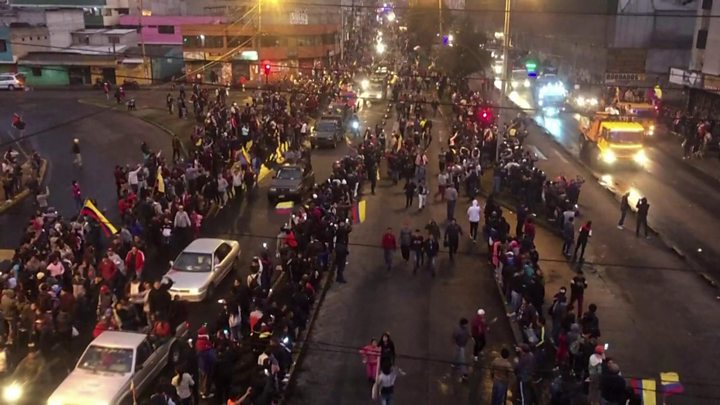Home » Latin America »
Ecuador protesters storm parliament amid unrest
Protesters have clashed with security forces inside Ecuador’s heavily guarded parliament after days of unrest forced President Lenin Moreno to move the government out of the capital.
Demonstrators briefly burst through a police cordon before being driven back with tear gas, witnesses said.
Mr Moreno declared a state of emergency last week but has failed to end protests led by indigenous groups.
They are demanding an end to austerity and the return of fuel subsidies.
Petrol prices have soared by more than 100% since last Thursday when the subsidies were removed.
Indigenous-led protests have toppled three presidents in the past few decades.
Amid the worst unrest in years, the embattled government has said it is open to mediation through the United Nations or the Roman Catholic Church.
What’s the latest?
Witnesses said protesters, some of whom were carrying wooden shields, broke through a security cordon around the National Assembly building on Tuesday. Once inside they waved flags and chanted slogans before being forced back by security forces using tear gas. No staff were in the building at the time.
Other government buildings in the capital were also attacked and damaged, local media reported.
It comes hours after President Moreno announced that he had temporarily moved government operations from the capital to the port city of Guayaquil.
In a televised address on Monday, he said he would not back down on the fuel price increase and accused his opponents of attempting a coup.
What has led to the trouble?
Mr Moreno’s announcement last week of an end to subsidies that had been holding down fuel prices triggered a strike by transport unions.
The unions later stopped their action, but protests have continued. Indigenous demonstrators have blocked roads and highways in the country and thousands have travelled to the capital Quito for bigger protests.
Some of the road blockages have affected petrol deliveries, leading to fuel shortages in parts of the country.
Officials said on Tuesday that the number of arrests had risen to 570.
Mr Moreno has declared a two-month national emergency over the unrest.
Why were fuel subsidies scrapped?
Mr Moreno said the subsidies, which cost the government $1.3bn (£1bn) annually, were no longer affordable.
The elimination of the subsidies, introduced in the 1970s, are part of his plan to shore up Ecuador’s flagging economy and ease its debt burden.
The government has agreed to cut public spending as part of a loan deal with the International Monetary Fund (IMF).
The agreement, signed in March, allows Ecuador to borrow $4.2bn (£3.4bn).
Source: Read Full Article




